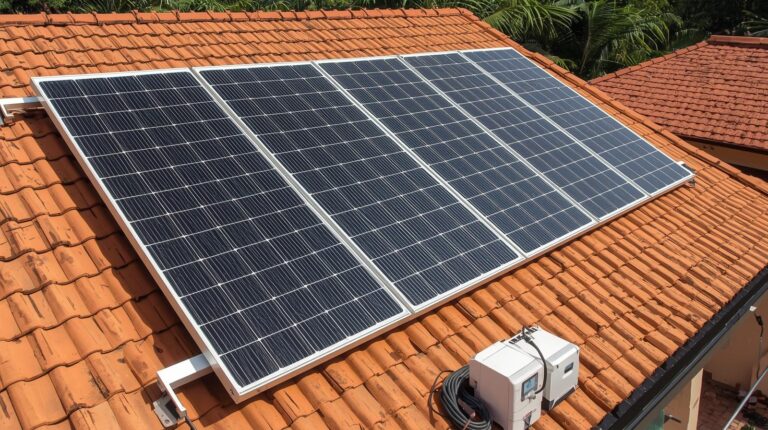Are you curious about AC solar panels? Did you know that these panels have an integrated inverter, eliminating the need for a central one? With AC modules, installation becomes easier and labor costs are reduced. Plus, you’ll enjoy module-level performance monitoring and longer warranty coverage compared to other types of installations.
Enphase, a leading brand, offers AC modules with microinverter technology for added safety and efficiency. Discover the streamlined value chain, easy installation process, and long-term reliability of AC solar panels in this informative overview.
Key Takeaways
- AC solar panels have integrated inverters, eliminating the need for a central inverter.
- AC modules offer plug and play installations, reducing overall labor costs.
- AC modules typically have 25-year warranties for both the panel and inverter component.
- AC panels allow for module-level performance monitoring.
How AC Solar Panels Work
AC solar panels work by converting DC electricity produced by the solar panels into usable AC electricity. This allows you to power your home with the energy generated from sunlight.
Unlike traditional solar panels that produce DC electricity, AC panels have an integrated inverter that converts the DC power to AC power right at each panel. This eliminates the need for a central inverter and allows for easier installation and maintenance.
AC panels are specifically designed for powering homes and other AC-powered devices, making them ideal for residential use. With AC solar panels, you can harness the power of the sun to generate clean energy and reduce your reliance on fossil fuels.
Benefits of AC Solar Panels
One of the advantages of AC solar modules is that they come with integrated inverters, making installation easier. These integrated inverters convert the DC electricity produced by the solar panels into usable AC electricity, eliminating the need for a separate central inverter. AC modules offer several benefits for system owners and installers.
| Benefits of AC Solar Panels |
|---|
| Easier installation |
| Module-level performance monitoring |
| Longer warranties |
AC solar panels simplify installations by eliminating the need for extra materials and manual connection of components. With plug and play installations, labor costs are reduced. Additionally, AC modules typically come with 25-year warranties for both the panel and inverter component, providing peace of mind to system owners.
Furthermore, AC panels allow for module-level performance monitoring. This means that one underperforming panel does not affect the overall production of the rest of the array. Maintenance becomes quicker as specific panels causing performance issues can be identified.
Overall, AC solar panels provide a streamlined installation process, longer warranty coverage, and better performance monitoring compared to traditional DC solar panels.
Easy Installation of AC Modules
Installing AC modules is easier and more efficient because they eliminate the need for extra materials and manual connection of components. AC modules come with an integrated inverter, which converts DC electricity produced by the solar panels into usable AC electricity. The microinverter is already attached to the back of the panel, so you don’t have to worry about connecting it separately. This makes installation simpler and faster, reducing labor costs.
With AC modules, you also minimize the impact of one underperforming panel on the rest of your array, as each panel operates independently. Additionally, AC modules typically come with longer warranties for both the panel and inverter component compared to other types of installations.
Warranties for AC Solar Panels
Enphase IQ Series Microinverters are directly integrated into the manufacturing process of solar panels, making installations faster and easier.
When it comes to warranties for AC solar panels, there are several key benefits to consider:
- Extended coverage: AC panels typically come with 25-year warranties for both the panel and the inverter component, providing peace of mind for system owners.
- Longer warranty periods: Unlike other types of installations that may have shorter warranties for inverters lasting only 10 to 15 years, AC modules offer longer warranty coverage.
- Simplified support: AC panels usually have one designated manufacturer as the point of contact for customer support, streamlining assistance in case any issues arise.
- Individual panel monitoring: With AC solar panels, you can monitor the performance of each unique panel independently. This allows for quicker maintenance by identifying specific panels causing performance issues and minimizing their impact on the rest of the array.
Overall, warranties for AC solar panels provide extended coverage, simplified support, and individual panel monitoring capabilities that contribute to a more reliable and efficient system.
Module Level Performance of AC Panels
To maximize the performance of your AC panels, monitoring the output of each individual panel allows for quicker maintenance and identification of any issues. By monitoring the performance of each unique panel, you can ensure that your solar system is operating optimally.
AC modules enable module-level performance monitoring, meaning that one underperforming panel will not affect the production of the rest of the array. This eliminates the problem of decreased performance due to shading or product defects in one panel.
With AC panels, you have peace of mind knowing that any issues can be quickly identified and addressed, ensuring maximum efficiency and energy production. Check out the table below for a comparison of leading AC modules and their features.
| Brand | Microinverter | Features |
|---|---|---|
| SunPower A-Series | Enphase IQ7AS | Optimal Performance |
| SunPower X-Series | Enphase IQ7XS | Record-breaking Efficiency |
| Q.PEAK DUO BLK-G6+/AC | Enphase IQ7X | High Performance & Smart-Grid Readiness |
| Panasonic N330E HIT® | Enphase IQ7X | Advanced Features & High Efficiency |
| Solaria PowerXT | Integrated Inverter | Aesthetics & Performance |
Components of Solar AC Modules
If you’re considering solar power for your home, understanding the components of AC modules is important. AC solar panels, also known as AC modules, have an integrated inverter that converts DC electricity produced by the solar panels into usable AC electricity. Here are the key components of AC modules:
- Solar Module: This is the panel that absorbs power from the sun and creates an electric charge through its grid-like pattern of solar cells.
- Microinverter: The microinverter technology on the back side of the solar panel converts the DC output of a single panel into AC power. It is integrated directly into each panel during manufacturing.
- Inverter: The inverter component converts DC electricity to usable AC electricity at each panel, eliminating the need for a central inverter.
- Enphase IQ Series Microinverters: These microinverters are specifically designed for integration with solar AC modules and offer features like plug-and-play installations, panel-level monitoring, and low-voltage design.
Understanding these components will help you make informed decisions when choosing AC modules for your solar power system.
Advantages of Microinverter Technology
Microinverters on AC modules greatly simplify the installation process. With microinverters integrated directly into each panel, you no longer need to worry about a central inverter. This means less equipment to carry and manually connect during installation. DC wire management is also minimized, reducing installation time.
The plug-and-play design of AC modules makes installations faster and easier, contributing to shorter installation times and potentially lower labor costs. You can avoid dealing with securing wires and cables connecting panels to a central inverter. Additionally, AC modules are designed for easy rooftop installation, making the process even more convenient.
Overall Benefits of Solar AC Modules
When considering solar energy options, you’ll find that AC modules offer a wide range of benefits for both system owners and installers. Here are some key advantages of solar AC modules:
- Streamlined installation process: AC modules eliminate the need for additional components and manual connections during installation, making it easier and faster to set up your solar system.
- Longer warranties: AC panels typically come with 25-year warranties for both the panel and inverter component, providing peace of mind and long-term reliability.
- Module-level performance monitoring: With AC modules, each panel operates independently, allowing for individual panel performance monitoring. This means that one underperforming panel won’t affect the overall production of the array.
- Easy maintenance and troubleshooting: AC panels enable quicker maintenance by identifying specific panels causing performance issues. This eliminates the problem of decreased performance due to shading or defects in one panel.
Leading Brands of AC Modules and Their Features
Enphase offers a wide range of AC modules with integrated microinverters. These AC modules are designed to provide optimal performance and efficiency for residential and commercial solar installations.
By combining the solar module and microinverter into a single package, Enphase AC modules simplify the installation process and reduce labor costs. Let’s take a look at some leading brands of AC modules and their features in the table below:
| Brand | Features |
|---|---|
| SunPower A-Series | Integrated with Enphase IQ7AS microinverters |
| SunPower X-Series | Tailor-made for Enphase IQ7XS microinverters |
| Q.PEAK DUO BLK-G6+/AC | High performance with smart-grid readiness |
| Panasonic N330E HIT® | Advanced features with Enphase IQ7X Microinverters |
| Solaria PowerXT | Integration of inverter, module, and monitoring |
These leading brands offer various benefits such as high efficiency, advanced features, and easy installation. With Enphase-powered AC modules, you can enjoy reliable solar energy production while reducing your environmental impact.
Advantages of Plug-and-Play Technology in AC Panels
You’ll appreciate the convenience and simplicity of plug-and-play technology in AC panels. With this innovative feature, installing and maintaining your solar panels becomes easier than ever before. Here are four reasons why plug-and-play technology is advantageous:
- Effortless Installation: AC panels eliminate the need for complicated wiring and manual connections. Simply plug them into a power source, and they’re ready to go.
- Time and Cost Savings: The plug-and-play design reduces installation time, resulting in lower labor costs. You won’t have to deal with securing wires or cables, making the process more efficient.
- Ease of Maintenance: Troubleshooting and repairing AC panels is simplified with plug-and-play technology. Identifying faulty components becomes quicker, allowing for faster maintenance.
- Compatibility: Plug-and-play functionality ensures compatibility between different components of the system, reducing the risk of errors or complications during installation.
With these advantages, plug-and-play technology makes AC panels a convenient and user-friendly choice for your solar energy needs.
Frequently Asked Questions
What Is the Average Cost of Installing AC Solar Panels Compared to Traditional Solar Panels?
The average cost of installing AC solar panels is generally higher than traditional solar panels. However, the benefits of easier installation and increased energy production may outweigh the initial cost for many homeowners.
Are There Any Government Incentives or Rebates Available for Installing AC Solar Panels?
Yes, there are government incentives and rebates available for installing AC solar panels. These incentives vary depending on your location, so it’s important to research and consult with local authorities or solar installation professionals to determine what is available in your area.
How Do AC Solar Panels Perform in Extreme Weather Conditions, Such as High Winds or Hailstorms?
In extreme weather conditions, like high winds or hailstorms, AC solar panels have the capability to withstand and perform well. They have durable construction and protective measures to ensure their functionality and durability during harsh weather events.
Can We Use AC Solar Panels in Off-Grid or Remote Areas Without ACcess to the Utility Grid?
Yes, you can use AC solar panels in off-grid or remote areas without access to the utility grid. They provide a reliable source of electricity by converting sunlight into usable AC power at each panel.
Are There Any Specific Maintenance Requirements for AC Solar Panels, and How Often Do They Need a Service?
There are specific maintenance requirements for AC solar panels, and you should have a regular service schedule for them. The frequency of servicing depends on factors like weather conditions and panel performance.
Conclusion
AC solar panels are revolutionizing the world of solar energy. They offer a streamlined value chain and increased reliability with their integrated inverters and module-level performance monitoring. Installing AC modules is a breeze, saving time and reducing labor costs.
The 25-year warranties provided by leading brands like Enphase provide peace of mind and longer coverage compared to other installations. Additionally, the advantages of microinverter technology ensure safe operation and efficient energy production.
So why settle for anything less? Embrace the power of AC solar panels and harness the sun’s energy with confidence.




